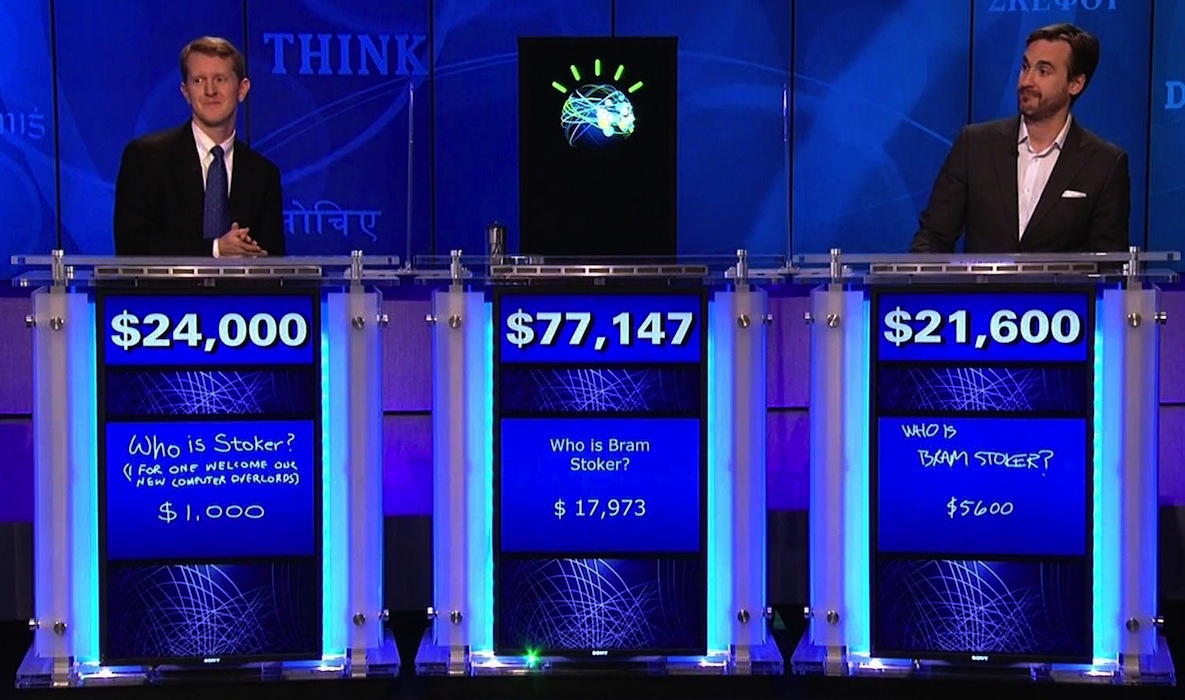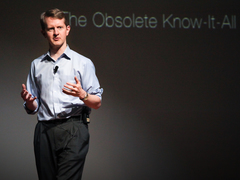
Ken Jennings (left) faces off against supercomputer Watson (center) and his fellow Jeopardy champion, Brad Rutter (right).
Perhaps you know Ken Jennings by name, perhaps you simply know him as “that guy with the winning streak on Jeopardy.” In 2004, this trivia enthusiast won an incredible 74 consecutive times on Jeopardy, setting the record as the classic game show’s most winning contestant and securing the Guinness World Record at the time for “most cash won on a game show.”
 Ken Jennings: Watson, Jeopardy and me, the obsolete know-it-all
In today’s talk, he shares how he became obsessed with trivia as a young child.
Ken Jennings: Watson, Jeopardy and me, the obsolete know-it-all
In today’s talk, he shares how he became obsessed with trivia as a young child.
“I remember being able to play Trivial Pursuit against my parents and hold my own,” says Jennings in this talk, given at TEDxSeattleU. “There’s a weird sense of mastery you get when you know some …. Beattles factoid that dad didn’t know. You think, ‘Aha. Knowledge really is power.’”
In 2011, however, Jenning’s legacy changed when he accepted a match against the IBM supercomputer, Watson.
“I was pretty confident that I was going to win,” says Jennings of how he felt going into the match. “I had taken some Artificial Intelligence classes and I knew there were no computers that could do what you need to do to win on Jeopardy. People don’t realize how tough it is to write that kind of program that can read a clue in a natural language like English — to understand the puns, the red herrings, to unpack just the meaning of the clue … I thought, ‘Yes I will come destroy the computer.’”
But that’s not exactly what happened. To hear how the match what down (interestingly, Jennings said it had an energy far more like a basketball game than a game show) and the profound lessons Jennings learned from it about the state of knowledge, watch this hilarious talk.
Shortly after the Jennings-Watson showdown in 2011, TED hosted a panel of IBM experts and insiders about the supercomputer and its Jeopardy victory. Below, see the discussion between Final Jeopardy: Man vs. Machine author Stephen Baker, Watson’s principal investigator Dr. David Ferrucci, IBM Fellow Kerrie Holley and Columbia professor Herbert Chase.
So how did it feel to lose to Watson? Jennings shares in this talk.
“I felt obsolete,” he reveals. “I felt like a Detroit factory worker in the ‘80s seeing a robot that could now do his job on the assembly line. I felt like ‘Quiz Show Contestant’ was now the first job that had become obsolete under this new regime of thinking computers.”
Comments (171)
Pingback: Implementing QANet (Question Answering Network) with CNNs and self attentions – Data Science Austria
Pingback: Planet Funny With Ken Jennings - This Week's Six Pixels of Separation Podcast - Six Pixels of Separation
Pingback: SPOS #641 - Planet Funny With Ken Jennings - Six Pixels of Separation
Pingback: Stock Trading with Artificial Intelligence
Pingback: AI’s impact on network engineering now and in the future – S&A – Nader Group
Pingback: Advancements in Artificial Intelligence – 42Fifty
Pingback: AI's impact on network engineering now and in the future | Israelopadeyi.com - Wealth And Tech Digest
Pingback: AI’s impact on network engineering now and in the future - 3366NEWS
Pingback: AI’s impact on network engineering now and in the future - Briefing 'em
Pingback: AI’s impact on network engineering now and in the future - Hawkins Global Pte Ltd
Pingback: AI’s impact on network engineering now and in the future
Pingback: 8 Simple Sources for Creating Artificial Intelligence to Make Your Own Chatbot - ClearVoice
Pingback: Artificial Superintelligence: Unsere letzte Erfindung?
Pingback: Science Exhibition | Yogi's MindPalace
Pingback: Digital Transformation – Trends that are impacting our Jobs | Sales Gyan
Pingback: Is Cybersecurity A Second Coming For AI? - InfoSecHotSpot
Pingback: Is Cybersecurity A Second Coming For AI? (Forbes) |
Pingback: Is Cybersecurity A Second Coming For AI? - Forbes - InfoSecHotSpot
Pingback: Online Media and Campaign Management » Artificial Superintelligence: Unsere letzte Erfindung?
Pingback: IA Summit 2017: Designing for Humans - DreamingUX